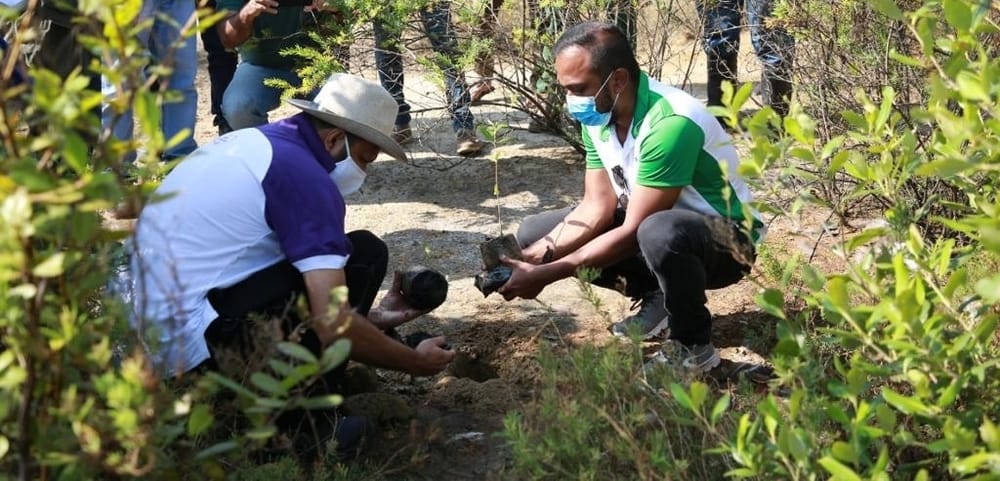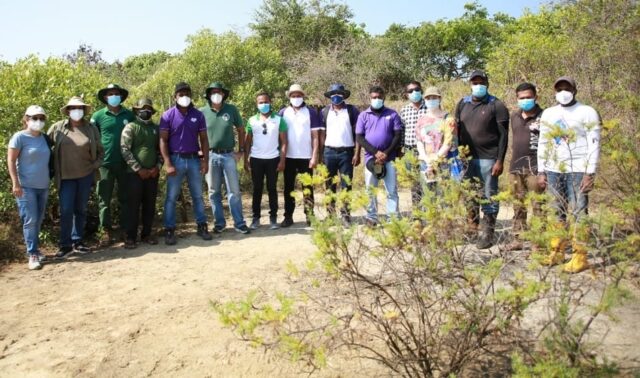
Achieving a milestone in its natural regeneration project to restore the Anawilundawa Ramsar Sanctuary, in collaboration with the Wildlife & Nature Protection Society (WNPS), Hemas Consumer Brands commemorated the World Wetlands Day on 2nd February 2022, with the momentous first transplanting of plants from the nursery to the wetland. The project is being spearheaded by 2 flagship brands, Baby Cheramy and Kumarika, the sponsors of this 5-year project, who are deeply committed to seeing it come to fruition as part of Hemas’ responsible environmental stewardship.
For many birding enthusiasts, Anawilundawa Ramsar Sanctuary is a place to go for bird-watching. The sanctuary is located in the Arachchikattuwa DS division of the Puttalam district with a total area of 1387 Ha, in close proximity to the Hemas manufacturing plant in Dankotuwa. As a truly Sri Lankan company, Hemas has a deep commitment for consumers and their welfare, making them the first-ever corporate to partner with the WNPS in the noble task of restoring mangroves within this sanctuary.
As Hemas celebrates World’s Wetland day, it proudly underscores the company’s continued commitment to the project until such time that the mangrove is restored to its former glory. As an important resting grounds, restored mangroves will ensure continued visitation by winged migrants. Also, healthy fish and shrimp will thrive in the mangroves as a natural support for strip farmers, since the pure water of the mangroves is used in shrimp farms.
Danushka Silva – Marketing Manager Baby Cheramy from Hemas Consumer Brands said, “Sustainability is deeply entrenched in Hemas’ corporate values and is a way of life across all our operations. When Hemas Consumer Brands embarked on this project a year ago in partnership with WNPS, it became the first corporate organization to pledge support for a mangrove restoration project. Mangroves are an essential part of the ecosystem and need to be conserved to maintain the balance in the environment for flora and fauna, as well as for protecting the coastline. We are proud to champion the restoration of the Anawilundawa Wetland Sanctuary.”

Started a year ago, a part of the project funding has been allocated for scientific study and continual analysis and measurement of the ecosystem. A total of 13 true mangrove species and 264 flora species have been identified at the Anawilundawa Wetland Sanctuary, which will be nurtured as part of the project.
Manjula Amararathne, Director (Protected Area Management) of the Department of Wildlife Conservation (DWC) said, “Scientific restoration of degraded mangroves needs patience, science, commitment from donors, community willingness and long-term monitoring. This initiative will teach us many lessons that can effectively be used in other sites. DWC looks forward to partnering with the right agencies for scientific activities like this that will benefit both nature and people.”
In order to carry out the plantation successfully, DWC and WNPS had already initiated a Plant Nursery with over 8 plants of which Rhizophora mucronata, Loop-root mangrove (Maha Kadol) holds the most number of plants with a survival rate of 90%.
W S S Fernando a local farmer commented, “Mangroves are a rich source of income for farmers like me who draw our sustenance from the local ecosystem as they protect the lagoons and the estuaries from erosion, reduce pollution of near-shore coastal waters, provide recreational grounds and opportunities for bird watching, fuel wood and more. Discharge of pollutants, illegal constructions and urbanization has put our livelihoods at risk. We are thankful to Hemas and WNPS and other stakeholders for this project which will ensure protection of this wetland and our traditional way of life.”
Representatives from Hemas Consumer Brands, WNPS, DWC, local farmers and well-wishers from the community were present on the occasion of the World Wetlands Day. They reiterated that peripheral communities can also avail of the benefits of the project.
Prof. Sevvandi Jayakody – Chair Professor, Department of Aquaculture & Fisheries, Wayamba University of Sri Lanka said, “Over the last 30 years, Sri Lanka’s mangrove forests have been destroyed due to habitat loss, degradation, direct use and over-exploitation of species etc. I am pleased to be part of this mangrove restoration project with the crucial support by Hemas by way of providing funding and resources to achieve natural regeneration of the wetland.”
On the occasion of World Wetlands Day, Hemas staff took part in an initiative of revegetating the inlet and outlet canals of farmers in and around the restoration site, thereby ensuring that the restoration is not just within the protected area but also within the community’s land.
Mahinda Wijesekera – Senior Manager Human Resources at Hemas Consumer Brands said, “Committed to contributing to the project with a holistic approach, Hemas carried out various training and activities to educate and create awareness amongst our staff and to the communities around our factory who have pledged their support towards this project. As a truly Sri Lankan company, we are proud to be restoring our national heritage and biodiversity to its former glory.”



